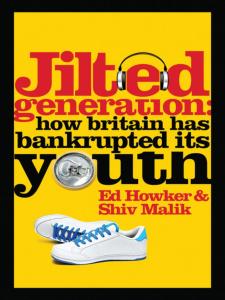
Probably the book which has angered, inspired and politicised me most in the last six months is Jilted Generation by Ed Howker & Shiv Malik.
Howker and Malik argue that the baby-boomer generation – those born between 1945 and 1965 – have enjoyed an uniquely privileged set of circumstances growing up – a set of circumstances which contrasts with the shoddy inheritance left to the generation after.
- Housing. As well as the sell off of council housing – a massive windfall for the baby-boomers – baby-boomers only had to borrow (on average) three times their salary to buy their two-up, two-down with a garden. Their debt was also diminished by high inflation rates. Since then the decline in house building, strict planning laws, and population growth have caused house prices to rocket – making baby-boomers rich, and pricing the young out of the market.
- Higher education. Boomers not only got their higher education for free, but once gained, their degrees were highly valued in the job market. Starting wages were comparably high. Today young people face £9000 a year tuition fees, a jobs regime that requires many young people to work for free on ‘internships‘, a lack of apprenticeships, and an economy that leaves one in five young people unemployed.
- Pensions. Boomers joined companies with final-salary schemes. Now most companies don’t have ANY pension provision. The ones left are risky ‘defined contribution’ schemes, paid later and requiring bigger contributions.
- Dismal government finances. We have a national debt of £867 billion, and that’s not including the PFI schemes and public sector pension liabilities that sit off the balance sheet. All the fuss at the moment about reducing the deficit (basically the nation’s overdraft) doesn’t touch the underlying debt.
- And there’s probably half a dozen other things I’ve forgotten
 These arguments have been set out elsewhere. David Willetts (now the higher education minister) in Pinch, calculates that with baby-boomers entering the job market later than the generation before (after going to University), whilst retiring in their 60s (earlier than those who will follow), combined with their long life expectancy, means they will take out 118% of what they put in to the welfare state.
These arguments have been set out elsewhere. David Willetts (now the higher education minister) in Pinch, calculates that with baby-boomers entering the job market later than the generation before (after going to University), whilst retiring in their 60s (earlier than those who will follow), combined with their long life expectancy, means they will take out 118% of what they put in to the welfare state.
What Howker and Malik do which is different


